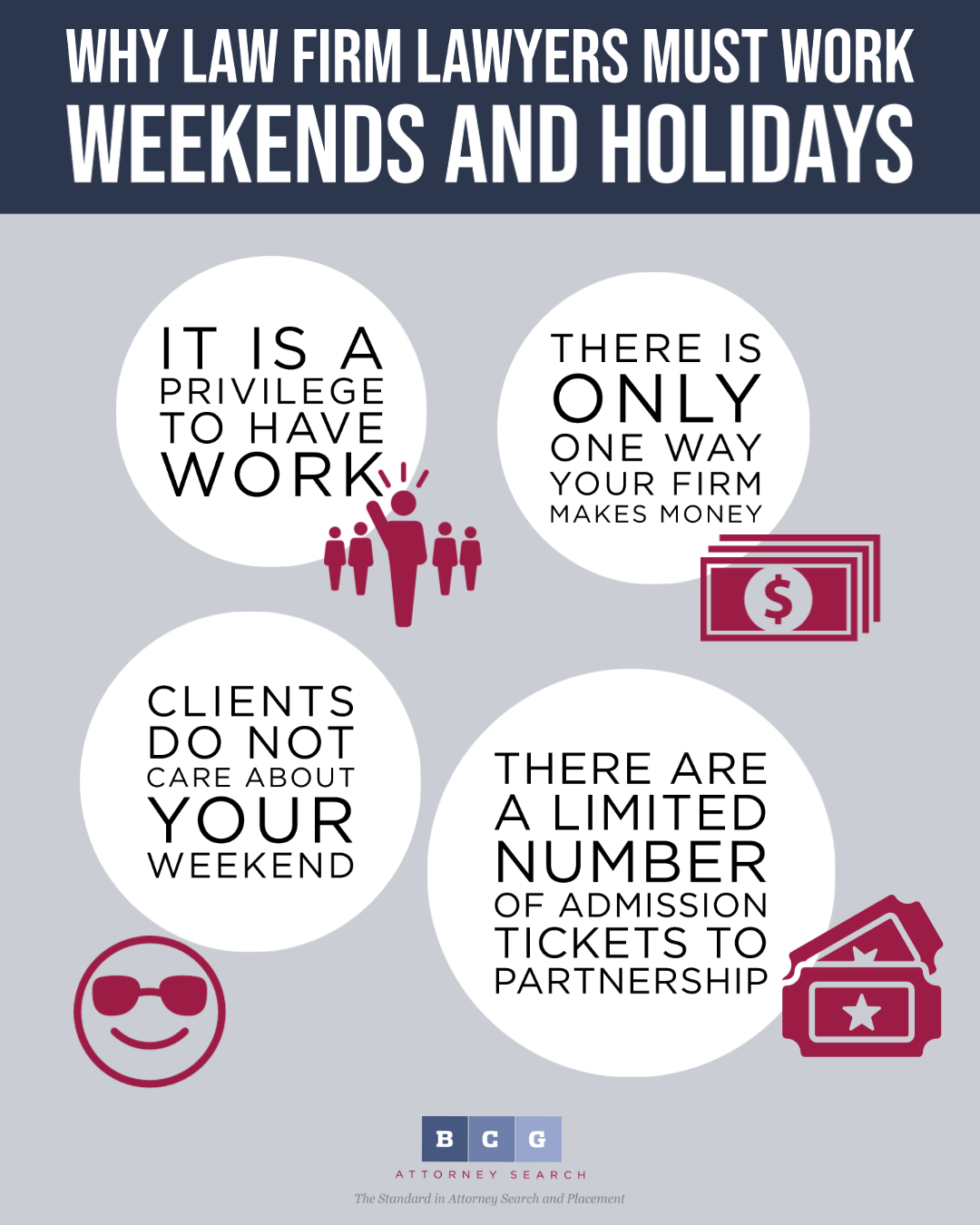

|
| Harrison Barnes |
Paradoxically, it is generally the youngest and most promising associates on paper whose careers take a hit due to their work ethic, in part because they are unwilling to work on weekends. Presumably, they think that they are immune from having to work hard because they can coast on the merits of what they did in the past. The purpose of this article is to discuss the necessity of working on weekends and holidays. I understand that this message may seem overly harsh, and for a young associate, it does sound harsh. Nevertheless, unless you are working weekends and holidays as an attorney, your career with most serious law firms will be short-lived.
Why should you work work weekends and holidays as an associate?
-
It is a privilege to have work,
-
There is only one way your firm makes money,
-
Clients do not care about your weekend,
-
There are only a certain number of admission tickets to the partnership, and
-
You will not always be expected to work weekends and holidays.

- See The #1 Attorney Career Killer that Attorneys Are Never Taught for more information.
A. It is a Privilege to Have Work
Whether you realize it or not, if you are in a law firm with a lot of work, you should consider yourself very fortunate. The fact that a law firm has a lot of work means that the firm is doing something right. The presence of work means that the firm is generating money to pay your salary. The presence of great amounts of work means that the firm is probably getting repeat work from having done a good job with its current clients. The presence of work also means that the firm likely has opportunities for you to advance. You could not be luckier than to be in the position of being in a firm with a lot of work.
As someone who has been a legal recruiter for a long period of time in good and bad economic cycles, I have witnessed and spoken with hundreds of associates who were laid off by their firms or "downsized" because there was not enough work. I am talking about numerous talented young attorneys. Believe me, when the work goes away, these associates are not happy. Everyone in a firm gets nervous when there is not enough work because this means their jobs are in jeopardy.
There is also the potential situation where your firm may not have a lot of work, but you do. This is even better. If partners are seeking you out and giving you a lot of work, this means that they like your work product. If partners like your work and give you more work, you are being recognized and are in a position where you have added job security. Partners are not giving you excessive amounts of work to punish you. They do this to reward you.
If you are asked to do work on a weekend or holiday, keep in mind that there could be inverse problems much worse than this: (1) The firm does not have any work to give, or (2) the assigning partner thinks someone else's work is better than yours. Having work is a privilege.
B. There is Only One Way Your Firm Makes Money
,p>If your firm is like most law firms, there is only one way it makes money: by your billing hours. The firm does not make money when you are at a family gathering on the Fourth of July. The firm also does not make money when you are doing shots on Saturday night with your friends at a sports bar. The firm only makes money when you are billing.
As an associate, you likely have no idea of the economics of your firm. You do not know what the office space costs, what the furniture in your office and throughout the firm costs, and what the firm's obligations are for salaries for associates and staff, partner draws, and more. You simply have no idea. Regardless of what your firm's obligations are, your firm needs money (and lots of it) to survive. If you help your firm make lots of money, you will be contributing to its survival.
But the larger reason you should be concerned with your firm's making money is you. When partners and other decision makers evaluate you, they will be concerned with how many hours you are billing and how hard you are working because this is how they make money. If you were a law firm, would you rather have an associate taking up a desk who bills 1,500 hours a year or an associate who bills 3,000 hours a year? Clearly, the harder-working associate is going to be favored.
You need to bill hours and work hard in order for your firm to make money. This is essential. When it comes right down to it, your relationship with your law firm hinges on your ability to make it money. The law firm does not care when you do this, even if it means working on the weekend or over a holiday.
C. Clients Do Not Care About Your Weekend
I am sometimes astonished when I speak with associates in law firms who are upset about working on the weekends. The reason I am so upset is because I am putting myself in the shoes of one of their clients. In a large law firm, clients typically have major problems and transactions that the attorneys are working on. Whether it is "bet-the-company litigation," a major bankruptcy filing, or defending an important patent, the matter is likely to be extremely important to the client. The client needs attorneys who take its legal matters just as seriously as it does.
If you have issues with working on weekends and holidays on important and time-sensitive matters for clients, I have a question for you: "Why are you an attorney?" Attorneys exist to solve the problems of others. As someone in this role, you hold a great deal of importance for your clients. Your clients need someone who is not afraid to work weekends and holidays.
While you may think that the argument here is that you should only work weekends and holidays on "pressing and time-sensitive matters" for clients, the inverse is also somewhat true. Clients want to feel that their attorneys have their backs covered at all times. Clients are paying a lot of money for the work you are doing. If clients think that you are important enough to them that you are working on the weekends, they will be impressed and feel you are working diligently on their behalf. Clients also want to feel that the work you are doing for them is the most important thing on your agenda. Working weekends and holidays makes them think this.
D. There Are Only a Certain Number of Admission Tickets to the Partnership
There are only a certain number of people that your law firm can admit to the partnership. Due to this, your law firm will be seeking to find reasons to not make you partner when the time comes for you to be considered. Notice I used the word "not." Law firms are generally seeking reasons to exclude you from consideration from partnership because the number of spots they have is so limited. In a major New York firm with 40 associates in an entering class, for example, it would be exceedingly rare for more than 1 or 2 of these first-year associates to ever make partner.
One of the strangest things about working in a law firm is that once you get competent in your work, most law firms will not give you a lot of encouragement. If you work much less than others in your class, the law firm might not even say anything to you. This makes asking you to leave or not making you partner much easier to justify in the firm's mind.
When you are working as an associate inside of a law firm, you need to do everything within your power to stand out from your peers if you want to beat them in the race to being a partner. Working weekends and holidays when others are not is a very easy way to achieve this. You need to demonstrate your commitment to the firm and your work in order to get ahead.
- See Top 10 Characteristics of Superstar Associates Who Make Partner for more information.
E. You Will Not Always Have to Work Weekends and Holidays
Those who expect you to work weekends and holidays almost certainly did the same thing before they became your supervisor. In fact, they probably were among the hardest-working associates at the firm. Because they did this too, they see absolutely nothing wrong with your doing the same. In order to rise, you must bond with your superiors. You can do this by showing them that you are sharing the same experiences they once had.
As an associate, you are beneath partners and more senior associates on the totem pole. You also presumably do not yet have children and the myriad responsibilities that come with this. You are also younger, which means you have more energy for the work. (At least, this is how the firm is thinking.)
When you get more senior and if you survive the initial "hazing," then you will presumably make partner and have others to work weekends and holidays. For the time being, though, you need to realize that this is part of the job and, due to your lack of seniority, you should be working weekends and holidays.
Conclusions
When people ask do lawyers work on weekends, you already know the answer. While much can be said against working weekends and holidays, you need to understand that this is something that is important to your firm, your clients, and your own advancement. If working weekends and holidays is offensive to you, perhaps you should consider another career outside of a competitive law firm. Certainly, there are firms where weekends and holidays are not expected at all. Nevertheless, because of the message working weekends and holidays sends to your clients and your superiors, you need to understand that it is something that will only help you if your objective is to get ahead.
Frequently Asked QuestionsHow Many Hours A Week Do Most Lawyers Work?
The hours' lawyers work more than 40 hours per week. It is not unusual for lawyers (particularly Big Law attorneys) to put in 80 hours a week. Full-time lawyers, on average, worked 49.6 hours each week in 2018, according to the Legal Trends Report. Furthermore, 75% of attorneys say that they frequently or constantly work outside of normal business hours, and 39% believe this impacts their personal life.
What accounts for the variance in the number of hours different lawyers work? Numerous factors—from firm size to practice area to geographic location—impact the working hours of a lawyer.
For example, the hourly expectations of a corporate lawyer at big law firms like in Manhattan are likely higher than those of family lawyers at a mid-sized firm in Ithaca. According to the 2020 Legal Trends Report, the average hourly rates in these practice areas is $330 and $265, respectively. While the corporate lawyer can pull higher financial compensation than the family lawyer), the big city corporate lawyers will have to contend with billable hour minimums and on-call demands—which means more working office hours.
Why Do Lawyers Work So Many Long Hours?
What motivates full-time attorneys to work more than the usual 40 hours a week? The answer is complicated, but there are several factors at play.
- Billable hours requirements. Attorneys are required to meet specified minimum billable hours requirements if they work for a law firm. Attaining this amount of billable client activity is extremely time-consuming, both in time spent preparing documents and closing matters. When these billable hours are added to non-billable (but nonetheless crucial) activities like client intake, case management, and attending mandatory firm meetings, the result is a 50- to 80-hour week. Law firms and other employers measure productivity with billable hours because billable hours equal revenue for the business.
- The catch-up cycle. TIt's a problem for attorneys in firms with billable-hour requirements, but it isn't limited to them. According to the 2018 Legal Trends Report, 77 percent of lawyers work outside of normal business hours to catch up on work that wasn't finished during the day.
- Client service. Clients should come first, and this might put a strain on lawyer working hours. According to the 2018 Legal Trends Report, 51% of attorneys work outside of normal business hours to be accessible to clients.
- Compensation structure. According to the American Bar Association, equity partners at law firms are often expected to work 60 or more hours a week. But salaried lawyers are also affected by their organization's compensation structure. Salaried attorneys who bill clients hourly must spend time on activities that are not billable but do advance the firm's bottom line. For this reason, salaried attorneys in private practice often work more than 40 hours a week.
- The demand for hard work. The relative supply and demand in the legal profession is an important factor in why lawyers put in so many extra hours. It cannot be ignored when discussing how much time attorneys spend practicing law for their clients. In short, there are more qualified attorneys than there are positions available at law firms, but most attorneys want to work at a top-tier firm. A relatively small percentage of all licensed attorneys work as partners in highly prestigious law firms, so competition for these positions is intense.
What Is The Typical Work Schedule For A Lawyer?
On any given day, the average lawyer is handling research and reviewing documents. Lawyers can also spend a large portion of their time in court or meetings with clients, opposing counsel, and co-counsel. Because of this broad range of responsibilities, lawyers don't have a typical day scheduled unless they work on an assembly line during specific hours.
Many attorneys work long, irregular hours and nights. Some lawyers also travel in connection with their law practice, attending conferences and meetings in different locations around the country and world.
The workload for a lawyer is generally dictated by their written attorney-client agreement that sets out the specific scope of representation, the fee arrangement, the payment schedule, and what services are to be performed by the firm. In other words, a lawyer's workload is governed by the specific terms of the attorney-client agreement between them and their client.
In addition to being tied to a written agreement, a lawyer can also be bound by ethical rules regarding the minimum number of billing hours and charging a client for the hours worked. For example, many states have rules that specify how much time can be spent on various phases of a case and what types of expenses are allowable to the client.
Do Most Lawyers Work On Weekends And Holidays?
In general, most lawyers work on weekends. You serve the needs of your clients as a lawyer in the professional services sector. Attorneys are required to meet deadlines that do not always match their schedules. They are being compensated for being available for their clients' issues full-time.
The amount of time you spend working on the weekend or on a holiday is determined by the type of lawyer you are.
Big Law Attorneys
Big Law attorneys frequently bill more than 2200 hours each year. In certain years, some have billed up to 3000 hours. This works out to a 50-70 hour work-week on average. These prestigious private firms offer a premium for their lawyers' availability, which essentially means that they are always available.
However, in large businesses, attorneys from various practice areas encounter varying degrees of predictability in their working hours. Lawyers in a litigation group, for example, may have more predictable work schedules since the timeline and deadlines for a trial are clearly defined by law or according to court calendars.
Clients won't often contact you out of the blue to ask questions or make demands in a lawsuit since attorneys have more freedom to choose the most effective approach to achieve the client's objectives in court.
However, there are instances when your firm's partners need everyone to work together in an emergency due to a rapidly occurring client situation. Your adversary counsel may occasionally throw you a curveball in court, and you'll have to spend the weekend drafting a response to fulfill the court deadline.
On the other side, corporate merger and acquisition (M&A) lawyers may have less predictability in their job schedules. During this time, you must meet a series of short targets to complete the transaction as quickly as feasible. The deal will constantly be evolving. Clients may contact you frequently to investigate their contract structure or look into a set of contracts just in case the terms of the contract change while the company-side negotiates with one another.
Smaller Firm Attorneys
Litigation attorneys in smaller firms may experience a similar work schedule since they too are subject to the court's deadlines.
Other attorneys, such as immigration attorneys, may work from 9-7 PM each day.
In-House Lawyers
In-house lawyers work in the legal departments of banks and corporations. They work with purchasing agreements, non-disclosure agreements, intellectual licensing deals, and more. Many Big Law firm attorneys will exit into an in-house counsel position due to a lighter workload and better work-life balance. In-house lawyers do not usually work weekends.
Prosecutors and Public Defenders
Prosecutors and public defenders are public interest attorneys who represent clients in cases of concern to the general public. The government or non-profit organizations that defend individuals from disadvantaged groups for economic or social reasons can all fall under the broad term "public interest."
The official name for the individuals who prosecute legal actions on behalf of the government is "prosecutor." They can frequently return to work between 5 and 6:30 p.m., although they do not usually work on weekends.
A public defender is a lawyer hired to defend people who cannot afford legal representation in criminal cases. Public defenders often have regular work hours and disciplines, and they are similar to prosecutors in terms of scheduling. They also do not usually operate on weekends.
Legal Aid Attorney
A civil Legal Aid attorney is another type of public interest lawyer. They advocate for individuals from disadvantaged groups to ensure that all people have equal access to justice.
A Legal Aid attorney's daily routine varies greatly. They may depart by 6 p.m. each day on occasion, and they may be required to work 12-hour days at other times. Their days are occupied with meetings with clients, paperwork, preparing for trial, and occasionally attending community outreach events.
Federal Government Agency Attorney
Attorneys work for an independent federal agency like the Securities and Exchange Commission (SEC) or Commodity Futures Trading Commission (CFTC). These attorneys usually work 9 AM to 6 PM Monday through Friday and generally work on weekends.
Overall, lawyers work long hours, but some more so than others. In general, public-interest attorneys or those working in smaller firms will better balance their professional and personal lives than those at large law firms. Especially Big Law attorneys are more likely to work on weekends than other kinds of attorneys. The pay paid to large law firm lawyers (starting at $190K per year without bonuses) is considerably greater than that paid to public interest attorneys, and the hours put in may be a consequence of this.
Are Long Lawyer Working Hours Bad For Your Health?
Working long hours, regardless of the cause, is not a viable practice for many lawyers. Long-term overwork can also affect lawyers' professional prospects and health.
The following are some of the most prevalent medical issues linked to excessive lawyer time:
- Lawyer burnout. The feeling of being burned out may be more than simply tiredness: According to the Stress and Resilience Institute's Paula Davis-Laack, burnout is "the expression of continual job stress." Lawyers deplete their energy reserves and become highly vulnerable to burnout by working excessive hours in a high-stress work environment.
- Addiction and substance-use problems. Attorneys have a significantly higher rate of alcohol and substance-use disorders than other professions. A 2016 study by the Hazelden Betty Ford Foundation and the American Bar Association Commission on Lawyer Assistance Programs found 21 percent of licensed, and employed attorneys are problem drinkers.
- Mental health issues. Anxiety, sadness, and mental health issues are all common in the legal field. According to a Hazelden Betty Ford Foundation survey, 28% of licensed, working attorneys suffer from depression, while 19% experience anxiety symptoms.
- Sleep issues. The ABA Commission on Lawyer Assistance Programs found that 56 percent of employed attorneys were sleep-deprived, and 35 percent experienced short-term memory loss and concentration problems as a result.
- Heart attacks and strokes. Over time, the long hours required by the profession can reduce an attorney's ability to metabolize insulin and produce nitric oxide, leading to cardiovascular disease. A 2014 study of Italian lawyers linked long work hours with a high risk of cardiovascular disease. Lawyer overwork has also been linked to lengthy recovery times for stroke victims.
- Lawyer suicide. Career pressure is exacerbated by job security being an idea rather than reality for many attorneys, leading to additional stress. The National Law Journal reported in 2015 that the rate of lawyer suicides has increased since 2008, with about 250 attorneys dying by suicide each year.






